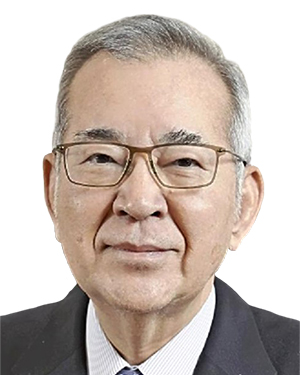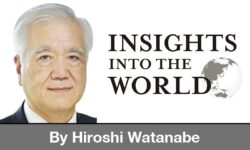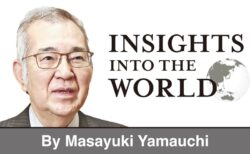11:00 JST, July 19, 2024
Reformist candidate Masoud Pezeshkian has been elected as the new president of the Islamic Republic of Iran. The former health minister’s victory can be said to reflect the Iranian population’s desire to see an end to Western economic sanctions and their wish for economic stabilization.
However, it should be noted that the Shiite nation’s head of state is not the president but the supreme leader, or rahbar. Supreme Leader Ayatollah Ali Khamenei has the final say in deciding the fundamentals of Iran’s national strategies, including those for negotiations with the West over the lifting of economic sanctions and Iran’s approach to the armed conflict between Israel and the Islamist group Hamas in Gaza and the civil war in Syria.
That is why, when Russian President Vladimir Putin visits Tehran, Khamenei is the one he holds lengthy talks with. He meets with the president only briefly.
Pezeshkian ran in the election as one of the candidates approved by the Guardian Council, a panel that supervises presidential elections and is ultimately overseen by the supreme leader. In other words, the president-elect is a Khamenei-approved reformist. This means Pezeshkian will face many obstacles if he seeks to restore the 2015 Iran nuclear agreement with the United States, the United Kingdom, France, Germany, Russia and China — from which then U.S. President Donald Trump withdrew the United States in 2018 — as a way of bringing an end to economic sanctions to improve the Iranian people’s lives.
As of early July, the Iranian rial’s foreign exchange rate was about one-nineteenth of what it was when the nuclear deal was signed. One of the president-elect’s urgent tasks is to stabilize the currency rate and lower Iran’s annual average inflation rate, which has risen to about 40%.
To that end, it is indispensable for Iran to resume oil exports and normalize trade to earn foreign currency.
To pursue such goals, Pezeshkian will have to win support for his policy initiatives from conservative hardline lawmakers, who hold a majority in the Iranian parliament, and from their master, Khamenei.
But it would be difficult for Khamenei to make concessions to the major Western countries to bring an end to sanctions if that agreement were to sacrifice the Tehran-backed Lebanese militant group Hezbollah and Yemen’s Houthi rebels — who both support Iran’s Islamic Revolution — as well as the Palestinian extremist group Hamas in Gaza and militias in Syria.
Is it therefore a foregone conclusion that Khamenei does not prioritize the lifting of sanctions? His thinking can hardly be that simple.
Ancient Roman historian Pompeius Trogus (active in the first century B.C.) is quoted as writing: “The king himself was always seen first to take to flight and last in battle. He was timid in danger and became haughty once the threat went away.”
The king Trogus ridiculed was King Xerxes of the Achaemenid Empire, who was defeated in the Persian Wars.
It is interesting to know that Xerxes and Khamenei have something in common. The Iranian supreme leader often scrutinizes the prevailing political circumstances so carefully that he tends to be ridiculed as timid. On the other hand, he sometimes takes bold political action while remaining silent.
To tell the truth, Israeli Prime Minister Benjamin Netanyahu is a politician who, too, has two sides — timidity and haughtiness. Though he tends to be considered rather talkative, he may be a strategist comparable to Xerxes and Khamenei in terms of always skillfully figuring out the timing of his escape even while waging a fierce attack.
The reality of history is that the more spectacular a leader’s words and actions are, the more likely unexpected crises and destruction are to ensue. Especially in the Middle East, there are scenes of silence that may put to shame even kabuki actors performing in the “danmari” (“in the dark” pantomime) scene of “Kagatobi” (firefighter of the Kaga clan). In that scene, all the actors must pretend not to be able to see each other or anything on the stage while searching for each other in silence in the dark.
Restrained acts by both sides
As recently as April, the Middle East witnessed an example of “danmari,” which helped to avoid an escalation of the Israel-Iran crisis.
On April 1, an Israeli airstrike demolished Iran’s consulate in Damascus, killing three senior Iranian commanders, including Gen. Mohammad Reza Zahedi of Iran’s Islamic Revolutionary Guard. Iran was enraged over the illegality of the attack on its embassy premises, which are protected under diplomatic privileges.
Netanyahu chose to stay silent and made no excuse for the attack on the Syria-based command post of the Islamic Revolutionary Guard that supports Hezbollah in Lebanon.
Israel’s war in Gaza has developed into a huge tragedy, killing more than 38,000 people in nine months, and has come under intense criticism from the international public.
By attacking the Islamic Revolutionary Guard, Netanyahu apparently wanted to soften international criticism by emphasizing the fact that the presence of Hezbollah, Iran’s proxy force in Lebanon, had forced about 60,000 Israelis to become internally displaced.
To attack targets in Israel, Iran unleashed a barrage of missiles and drones from its home territory on April 13 without relying on its proxy network, including Hezbollah. This was Iran’s first bold direct offensive against Israel, a development that would never have been possible without Khamenei’s supreme command of Iran’s armed forces and his strategic decision.
Netanyahu ordered a retaliatory strike on targets near the Natanz nuclear research facility in central Iran. But the attack was only meant to show off Israel’s ability to penetrate Iran’s missile-defense system, taking a “danmari” attitude to avoid the risk of having tensions escalate into a full-blown war.
What has happened to the Iranian and Israel leaders may be called a restrained “warfare of silence.” Khamenei must know the words of the 13th-century Persian poet Saadi, who wrote about the advantages of silence. “The possessor of deliberation, intelligence and shrewdness / Does not say a word till he sees silence,” Saadi wrote in “The Golestan” as translated by Richard Francis Burton.
President-elect Pezeshkian’s top priority will be to resurrect the 2015 nuclear deal without spoiling the significance of the supreme leader’s “warfare of silence” strategy on the one hand or giving up Iran’s ambition to possess nuclear weapons.
According to the May report of the International Atomic Energy Agency (IAEA), Iran’s stockpile of 60% highly enriched uranium — near weapons-grade — had already reached 142.1 kilograms, up 20.6 kilograms from February this year. The amount is theoretically enough to produce three nuclear warheads if the material is enriched from 60% to 90%, a process that is technically not difficult.
Nonetheless, it cannot definitely be said that Iran is inclined to join the world’s nuclear club as soon as possible. To date, Iran has instead used shrewd political means to carefully keep its distance from the dividing line of possessing nuclear weapons while forcing the United States and other major Western countries, as well as Japan, to make concessions to Iran and bluffing against the United States and Israel with the threat that it will arm itself with nuclear weapons.
The IAEA reported that this year, Iran has diluted its enriched uranium stockpile by mixing certain amounts of 60% enriched uranium with 2% enriched uranium on two occasions — in February and May — to reduce its stockpile of weapons-grade uranium at least for now. This shows how attentive Khamenei is to detail. The next U.S. president, to be chosen in November, will have to deal squarely with such a leader.
Khamenei, hidden in silence and shadows, should be the counterpart of the next U.S. leader, be it Donald Trump or Joe Biden, in pursuing a nuclear agreement and resolving the war in Gaza. President-elect Pezeshkian can never be in that position. This can be said to represent the inscrutable nature of Iran.

Masayuki Yamauchi
Yamauchi is a special adviser to Fujitsu Future Studies Center Ltd., where he specializes in Middle Eastern and Islamic area studies and the history of international relations. He is also a professor emeritus at the University of Tokyo, where he previously headed the school’s Center for Middle Eastern Studies, and a special visiting professor at Mohammed V University of Rabat in Morocco. He was a professor at Musashino University in Tokyo from 2018 to 2023.
The original article in Japanese appeared in the July 15 issue of The Yomiuri Shimbun.
Top Articles in Editorial & Columns
-

Riku-Ryu Pair Wins Gold Medal: Their Strong Bond Leads to Major Comeback Victory
-

40 Million Foreign Visitors to Japan: Urgent Measures Should Be Implemented to Tackle Overtourism
-

China Provoked Takaichi into Risky Move of Dissolving House of Representatives, But It’s a Gamble She Just Might Win
-

University of Tokyo Professor Arrested: Serious Lack of Ethical Sense, Failure of Institutional Governance
-

Policy Measures on Foreign Nationals: How Should Stricter Regulations and Coexistence Be Balanced?
JN ACCESS RANKING
-

Japan PM Takaichi’s Cabinet Resigns en Masse
-

Japan Institute to Use Domestic Commercial Optical Lattice Clock to Set Japan Standard Time
-

Israeli Ambassador to Japan Speaks about Japan’s Role in the Reconstruction of Gaza
-

Man Infected with Measles Reportedly Dined at Restaurant in Tokyo Station
-

Videos Plagiarized, Reposted with False Subtitles Claiming ‘Ryukyu Belongs to China’; Anti-China False Information Also Posted in Japan























